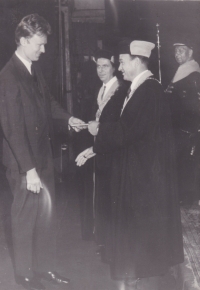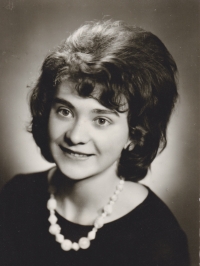Even today, I hate leather coats

Download image
Iva Bejčková, née Kořínková, was born on the 6th of May in 1947 in Havlíčkův Brod. Her family lived in Chotěboř where Iva went to the basic school and later to the high school. In his youth, Iva’s father Bohuslav Kořínek was a devoted scout, played in the local amateur theatre troupe and he was a member of the Czechoslovak National Socialist Party. On the 30th November 1953, the State Security stormed in the Kořínek house and arrested and imprisoned the father. Both his children were present during the arrest and the trauma they suffered damaged their health. In the show trial, the District Court in Pardubice pronounced fourteen court verdicts, Bohuslav Kořínek was sentenced to five years of imprisonment for grand treason. Allegedly, in 1949, he had attended at two meetings where damaging the interests of the Czechoslovak Republic was planned. After he got the sentence, he was placed to the prison in Ostrov in the Karlovy Vary area. The family was left penniless…. Bohuslav Kořínek was released on parole in 1956. In 1973, he died and only in 1990, he was fully rehabilitated. His son Miroslav could not pursue any higher education due to his family background and in 1971, he died of leukaemia, purportedly due to the toxic work environment. Iva left to study in Prague in 1965 and in 1967, she started to work in the Czechoslovak Radio where she witnessed the events of the occupation by the Warsaw Pact armies in August 1968. In 1973, she started working in the Aquacentrum company which belonged to the Central Council of Svazarm [Svaz pro spolupráci s armádou; Union for Cooperation with the Army]. In the 1980’s, she and her husband applied for adoption of a daughter but the social services office allegedly wanted Mr. Bejček to join the Communist party. After 2010, Mrs. and Mr. Bejček moved to Chotěboř where the witness lived at the time of recording (2020).























